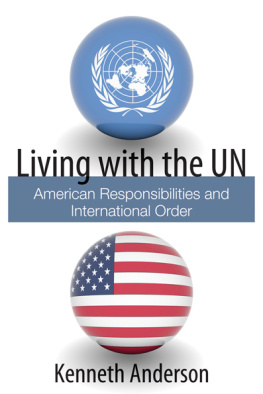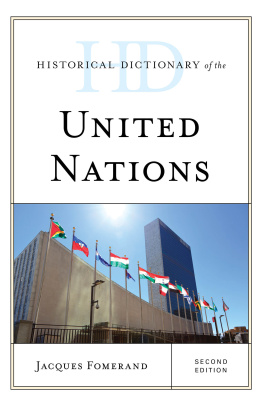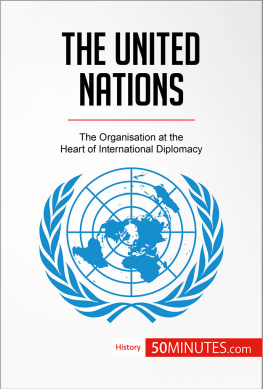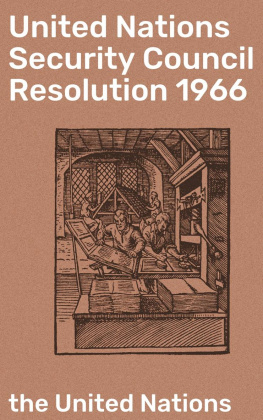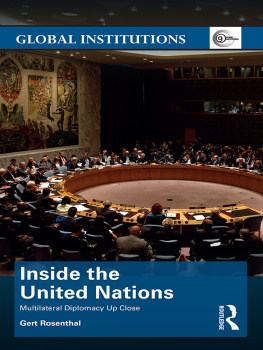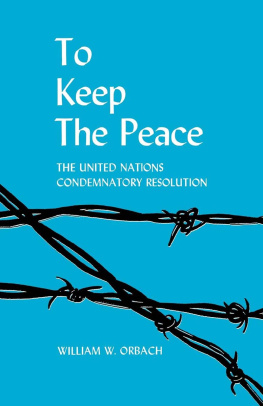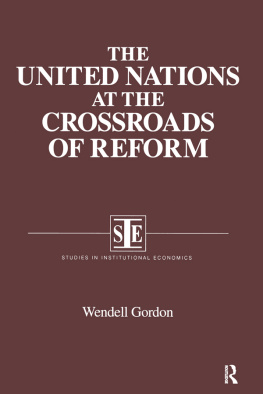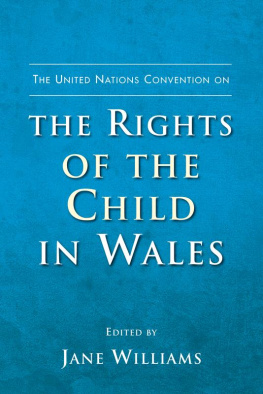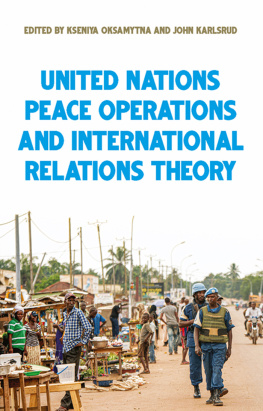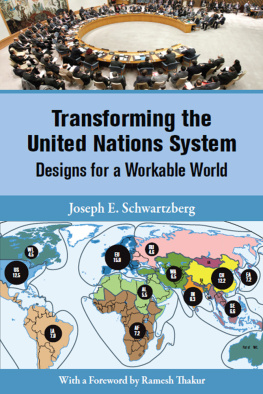Living with the UN
|  | The Hoover Institution gratefully acknowledges
the following individuals and foundations
for their significant support of the
Koret-Taube Task Force
on National Security and Law
and this publication:
K ORET F OUNDATION
T AD AND D IANNE T AUBE
T AUBE F AMILY F OUNDATION
J AMES J. C ARROLL III
J EAN P ERKINS F OUNDATION |
Kenneth Anderson
H O O V E R I N S T I T U T I O N P R E S S
STANFORD UNIVERSITY STANFORD, CALIFORNIA
The Hoover Institution on War, Revolution and Peace, founded at Stanford University in 1919 by Herbert Hoover, who went on to become the thirty-first president of the United States, is an interdisciplinary research center for advanced study on domestic and international affairs. The views expressed in its publications are entirely those of the authors and do not necessarily reflect the views of the staff, officers, or Board of Overseers of the Hoover Institution.
www.hoover.org
Hoover Institution Press Publication No. 609
Hoover Institution at Leland Stanford Junior University,
Stanford, California 94305-6010
Copyright 2012 by the Board of Trustees of the
Leland Stanford Junior University
All rights reserved. No part of this publication may be reproduced, stored in a retrieval system, or transmitted in any form or by any means, electronic, mechanical, photocopying, recording, or otherwise, without written permission of the publisher and copyright holders.
For permission to reuse material from Living with the UN: American Responsibilities and International Order , ISBN 978-0-8179-1344-1, please access www.copyright.com or contact the Copyright Clearance Center, Inc. (CCC), 222 Rosewood Drive, Danvers, MA 01923, 978-750-8400. CCC is a not-for-profit organization that provides licenses and registration for a variety of uses.
Hoover Institution Press assumes no responsibility for the persistence or accuracy of URLs for external or third-party Internet websites referred to in this publication, and does not guarantee that any content on such websites is, or will remain, accurate or appropriate.
First printing 2012
Manufactured in the United States of America
Library of Congress Cataloging-in-Publication Data
Anderson, Kenneth, 1956 author.
Living with the UN : American responsibilities and international order / Kenneth Anderson.
pages cm. (Hoover Institution Press publication ; no. 609)
Includes bibliographical references and index.
ISBN 978-0-8179-1344-1 (cloth : alk. paper)
ISBN 978-0-8179-1346-5 (e-book)
1. United NationsUnited States. 2. United StatesForeign relations2009 I. Title. II. Series: Hoover Institution Press publication ; 609.
JZ4997.5.U6A63 2011
341.23'73dc23 2011037056
For Jack Simon and Richard Anderson
Maintain power in as decent a
way as would be yet the most effective.
Thomas Berger, Arthur Rex
Ne serait-ce point une
Amerique lasse de son mtier?
Stendhal, Le Rouge et le Noir
CONTENTS
Part One: CONDITIONS
3 The US Global Security Guarantee
and UN Collective Security
Part Two: HEURISTICS
4 Always Engage: The United States
and the Security Council
5 Sometimes Engage: Internal UN Management
and the General Secretariat, the Buyout of
the UN-that-Works, and the Containment of the
UN-that-Doesnt
6 Parallel Engagement: International Development
and Global Human Welfare
7 Disengage and Obstruct: The UN-of-Values and
the Human Rights Council
About the Hoover Institutions Koret-Taube
Task Force on National Security and Law
ACKNOWLEDGMENTS
This book began a long time ago, in the midst of the UN reform efforts of 2005. It was originally conceived as a short essay on the United Nations, legitimacy, and global governanceand went through successive drafts until it at last became clear (even to the author) that all of these topics together and short were not compatible. It was eventually narrowed to US-UN relations, the topic it currently addresses. Although the fundamental question of defining multilateralism and engagement was present from the beginning, the election in 2008 gave greater impetus to that topic, as those terms began to feature ever more often in the diplomacy, and particularly the United Nations diplomacy, of the United States.
This book is a short foreign policy essay. It deliberately eschews the scholarly apparatus that would turn it into a law review article or academic monograph; the notes are limited to a small handful of substantive comments and citations to direct quotations, and very little else. The bibliography is aimed at the general reader and inquiring student and so focuses on secondary sources that are readily available, rather than leading into the fascinating but sometimes hard to research archives of the United Nations or academic literature not available to readers lacking research-library access. The aims of the book are modest policy ideas, not original scholarship or an exhaustive academic argument. The intent, rather, is to gather into a single usable, readable handbook a set of tools, heuristics, rules of thumb, policy templates to guide United States relations with the United Nations. The emphasis is on the present Obama administration, but certainly the author believes that these heuristics are applicable for future administrations of either political party.
The book in its current form owes an enormous debt to Benjamin Wittes, senior fellow at the Brookings Institution, a member of the Hoover Institution Task Force on National Security and Law, and a good and generous friend. In this instance, he reached back to his skills as a former Washington Post journalist and took a still unwieldy and untidy manuscript and cut it (the drive-by edit, he called it) into its current length and form. Without his skills, the term short would scarcely be applicable here and, likewise, such readability as the book possesses.
My thanks also go to the two editors of the Hoover Studies series, Tod Lindberg and Peter Berkowitz, whose patience waiting for this manuscript knows no bounds. But they have also contributed a great deal of sense and readability to the manuscript through their edits and probing questions, not all of which I am able to answer. I have received helpful feedback on various chapters of this book from members of the Hoover Institution Task Force on National Security and Law, and I thank them and particularly Stephen Krasner, Matthew Waxman, Jack Goldsmith, Philip Bobbitt, and Ruth Wedgwood. I am grateful to all of them; I am, of course, solely responsible for errors that remain. I should also like to thank two people who have been mentors to me in these fields and dear friends over many years, although, alas, I have grave doubts they will find the arguments of this book persuasive: Aryeh Neier and Henry Steiner.
I am also grateful to the Hoover Institution, its staff and director, John Raisian, for support over several years working on this volume, and to the staff of the Hoover Institution Press. Thanks also go to the Gingrich-Mitchell Task Force on the United Nations, a Congressionally sponsored task force on UN reform organized through the US Institute for Peace, on which I was privileged to serve as an expert during the 2005 UN reform process. Also, thanks are due to my law school, Washington College of Law, American University, and its dean, Claudio Grossman. Finally, thanks and appreciation go to my wife, Jean-Marie Simon, and my daughter, Renee, who offered love and support throughout this process.

